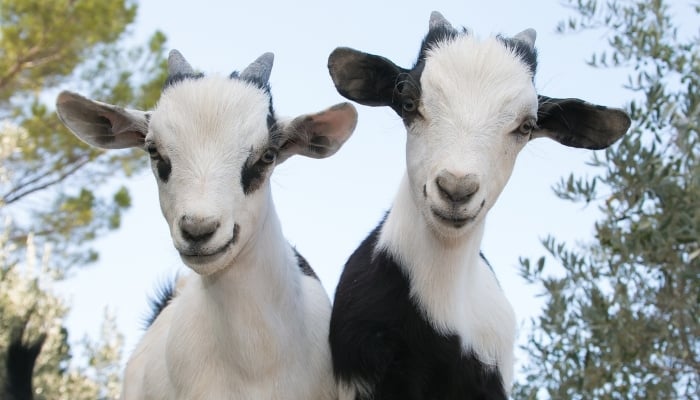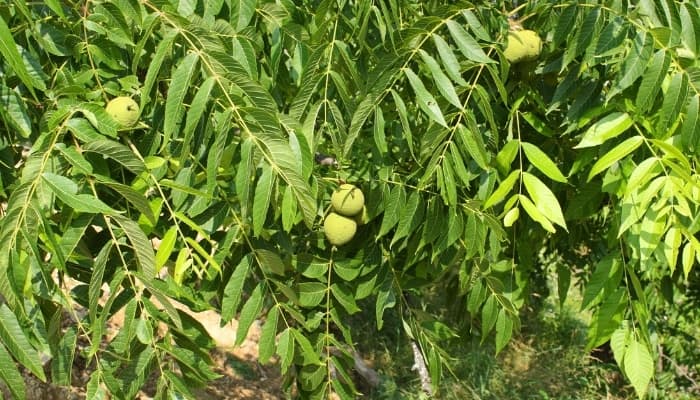Indigenous to North America, the black walnut tree (Juglans nigra) is highly prized for its fruits and wood.
However, the tree has a dark side to it. It produces a poisonous chemical known as juglone whose sole purpose is to thin out the competition and kill plants growing near the tree.
Are black walnut trees bad for goats? Black walnut trees are not considered safe for goats due to juglone, an herbicide produced by the tree. This chemical is found mainly in the roots but is also present in leaves, wood, and fruit hulls. Consuming large amounts of the leaves can cause diarrhea, vomiting, nausea, salivation, and coma.
It’s not just goats that are prone to the toxic effects of the juglone, and they don’t have to ingest the leaves of the black walnut tree to get poisoned.
Using black walnut shavings and sawdust for the goats’ bedding can also be toxic. Read more to find out what you need to be aware of when it comes to black walnut trees and goats.
Black Walnut Trees and Goats: What To Be Aware Of
Although juglone is produced mainly in the roots, other parts of the black walnut tree also contain trace amounts of the toxic herbicide.
If goats or other livestock ingest enough leaves or fruit husks or inhale enough sawdust, their lives and well-being could be put in jeopardy.
Black Walnut Trees Are Considered Toxic to Livestock
It’s a well-known fact that black walnut trees are toxic to livestock. Horses, cattle, and even goats may snack on the leaves and young shoots of the tree.
This exposes the livestock to the poisonous chemicals in the leaves and bark, even if they’re in trace amounts.
Another way for livestock to become exposed to the toxic juglone is if black walnut tree chips or sawdust is used as bedding for the animals.
Close proximity and direct contact with the sawdust can trigger allergic reactions in the animals.
The same goes for the black walnut tree pollen. In the spring when the flowers bloom, their pollen fills the air and is inhaled by humans and livestock alike.
Although the pollen is not poisonous, if inhaled in large amounts, it can cause irritation in the respiratory system and cause allergies to people sensitive to it.
What Parts of the Black Walnut Tree Are Toxic?
Juglone, the natural herbicide the tree produces, is present in varying degrees in many parts of the tree.
Its highest concentrations are in the roots, but it can also be found in the leaves, bark, wood, buds, and fruit hulls.
Here’s the lowdown of the toxicity of the various parts of the black walnut tree:
Black Walnut Hulls
Black walnut hulls are the husks covering the fruits of the black walnut tree. These hulls have moderate concentrations of juglone.
If goats and other animals ingest the black walnut hulls, they may experience symptoms ranging from vomiting and drooling to coma.
Take comfort in knowing that the hulls are not commonly consumed as most animals prefer the tasty leaves.
Black Walnut Leaves
The leaves of the black walnut tree are the parts most often consumed by livestock. The leaves have low concentrations of the natural herbicide the tree produces.
However, since animals could consume a lot of leaves at one time, the leaves could cause toxic reactions in large animals such as horses and cattle and small animals such as goats and sheep.
Black Walnut Wood
Black walnut wood isn’t very toxic, and since livestock don’t feed on the wood, there’s limited risk.
However, the problem occurs when animals are exposed to black walnut sawdust either when the tree trunks are being cut or more commonly when chips and sawdust are used for bedding.
Skin contact with sawdust can trigger allergic reactions in humans and animals.
Black Walnut Roots
The roots of black walnut trees have the highest concentration of juglone. That’s because the herbicide is produced to kill plants around the tree and reduce competition over resources.
For that reason, the roots do not pose a risk to animals or humans. They’re quite lethal though to plants such as tomatoes that grow under or in the vicinity of black walnut trees.
Do Black Walnuts Poison Other Plants?
Black walnut trees don’t like competition. The trees found a unique way to prevent other plants from growing nearby and sharing the same resources.
The black walnut tree produces a natural herbicide called juglone that kills other plants within 50 feet of the trunk.
Several plants including pears, apples, potatoes, tomatoes, azaleas, lilacs, and berries among others are more likely to suffer from stunted growth if planted near a black walnut tree.
Smaller plants could die prematurely as a result of absorbing juglone.
Are Black Walnut Leaves Antiparasitic?
Thanks to the natural herbicide the black walnut produces, its leaves are considered antiparasitic. In fact, some people make an herbal black walnut dewormer from dried hulls.
In traditional herbal medicine, people gargle extracts from the leaves to kill mouth bacteria.
The same extract has been used to treat skin infections and conditions such as warts, eczema, and psoriasis among others.
Many Goat Owners Report No Problems With Black Walnut Trees
Despite its toxicity to livestock both large and small, not all goat owners have had issues with black walnut trees. The goats need to eat a lot of the leaves to get affected.
Juglone is dangerous in its pure form, but the leaves of the tree contain other balancing chemicals that render the trace amounts of juglone almost harmless.
Still, there’s always a risk to feeding goats toxic leaves, no matter how mildly toxic they are.

Precautions To Take
To protect livestock and goats in particular against the dangerous toxins in the leaves and fruit hulls of the black walnut, it’s best not to let them get near the tree.
You could build a fence around the dripline of the tree to prevent the animals from feeding on the fallen leaves.
Another precaution to take is not to use chips or sawdust from the black walnut tree for bedding.
Juglone Poisoning Symptoms in Livestock
Juglone poisoning has various symptoms that depend both on the size of the animal and the amount of toxins they ingested or were exposed to.
Horses, for example, may stop eating, become very thirsty, and sometimes foam around the mouth as signs of juglone toxicity.
Cattle might have diarrhea and vomiting if they consume large amounts of juglone. Ingesting small amounts of the natural herbicide might show mild symptoms or go unnoticed.
As for goats and other small animals, the symptoms are often severe and require medical help.
Goats might drool, have red mouths, drink a lot of water, lose their balance, and vomit. In severe cases of juglone poisoning, the goat might go into a coma.
How Long Does Juglone Stay in Soil After Tree Removal?
After you remove the black walnut tree from the area, juglone remains effective in the soil for up to 2 months. During that period, the soil is unsuitable to grow most plants, veggies, and fruits.
How To Neutralize Juglone
Juglone is a natural herbicide that has no antidote. Plants that absorb it will wilt and die.
Animals that consume parts of the black walnut tree with high concentrations of the chemical may show symptoms that range from drooling to vomiting.
The best way to break down the toxic herbicide is to compost the leaves.
Black Walnut Tree Toxicity to Humans
The black walnut tree is just as toxic to humans as it is to livestock. Symptoms of toxicity vary but are similar to those exhibited by horses, cattle, and goats.
The fruits of the black walnut are not toxic, but the hulls, leaves, roots, and sawdust of the tree all contain varying concentrations of the toxin.
What Trees Are Poisonous to Goats?
Besides black walnut trees, yew, pine trees, St John’s wort, ivy, cherry trees, hemp, elderberry, and deadly nightshade are also toxic to goats.
Related Questions:
Can Goats Eat Pecans?
Pecan fruits and leaves are both safe for goats to consume in moderate amounts. Pecans contain tannin in small amounts, so ingesting too many of the leaves or fruits would give the goats diarrhea.
Can Goats Eat Almonds?
Only feed your goats a few almonds as a treat. Too many almonds can give the goats problems since they’re not part of their natural diet.
Conclusion
Black walnut trees produce a natural chemical called juglone, which is toxic to plants and livestock.
Goats might ingest the leaves of the tree without showing symptoms of toxicity, but it’s always better to keep the goats away from the tree and avoid using black walnut sawdust to line their bedding.

